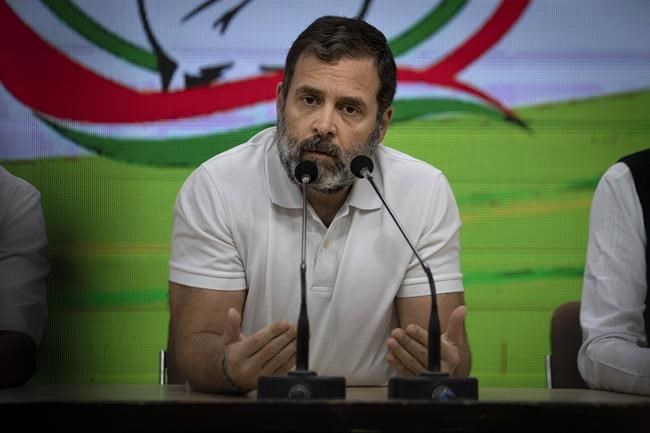NEW DELHI (AP) — India’s top court on Friday stayed the criminal defamation conviction of opposition leader Rahul Gandhi for mocking the prime minister’s surname. His party said it would now seek to have Gandhi reinstated as a member of parliament.
A fierce critic of Prime Minister Narendra Modi and his main challenger in 2024 polls, Gandhi was ousted from Parliament after his conviction by a magistrate’s court in March.
The stay by the Supreme Court means a temporary halt to the conviction while the court goes into Gandhi’s appeal in detail before issuing a final ruling.
Gandhi’s disqualification as a lawmaker also now remains in abeyance, said Live Law, an online portal for Indian legal news. Congress party leader K.C. Venugopal said the party would approach the Parliament speaker to restore his seat.
The court’s order also means that Gandhi will be able to contest next year’s general elections unless a final court decision goes against him.
Despite its decision, the Supreme Court observed that Gandhi's comments were not in “good taste” and said that a person in public life ought to have been more careful while making public speeches.
The defamation case involved comments Gandhi made in a 2019 election speech. Gandhi asked, “Why do all thieves have Modi as their surname?” He then referred to three well-known and unrelated Modis: a fugitive Indian diamond tycoon, a cricket executive banned from the Indian Premier League and the prime minister.
The case was filed by Purnesh Modi, who is a member of Modi’s Bharatiya Janata Party in Gujarat state but is also not related to the prime minister.
Gandhi was sentenced to two years in prison but the court suspended his prison sentence in April. The conviction was upheld by the Gujarat state High Court so he filed an appeal in the country’s Supreme Court last month.
The Supreme Court said the trial judge gave the maximum sentence of two years to Gandhi. Except for the admonition to Gandhi, no other reason was given for that sentence, the court said.
The case against Gandhi, the great-grandson of India’s first prime minister and scion of the dynastic Congress party, was widely condemned by opponents of Modi as the latest assault against democracy and free speech by a government seeking to crush dissent. The speed of his removal from Parliament shocked Indian politics.
Legal experts had earlier said Gandhi’s case is unusual as defamation convictions remain rare, especially with the maximum sentence.
Gandhi on Wednesday reiterated in an affidavit before the Supreme Court that he is not guilty of the offense of criminal defamation. He said he will not apologize for his remark and that if he wanted he could have made it much earlier.
Gandhi also said that there is no community going by the name ‘Modi’ and so he cannot be accused of defaming Modi community as a whole. People having the surname Modi may fall into different communities and castes, he said.
Purnesh Modi said in his counter affidavit that Gandhi has shown arrogance rather than being apologetic.
India, with 1.4 billion people, is the world’s largest democracy. However, Modi’s critics say democracy has been in retreat since he came to power in 2014. They accuse his government of pursuing a Hindu nationalist agenda. The government denies that, saying its policies benefit all Indians.
The Nehru-Gandhi family has produced three prime ministers. Rahul Gandhi’s grandmother, Indira Gandhi, was assassinated while in office, as was his father, Rajiv Gandhi, after he left office.
___
Associated Press Writer Krutika Pathi contributed to this report from New Delhi.
Ashok Sharma, The Associated Press


